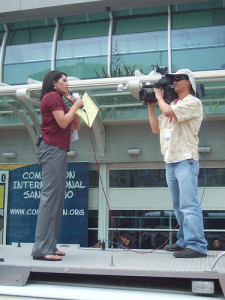Few careers are more difficult to obtain and be successful in than sports journalism jobs; specifically broadcast journalism. In many ways, your dream of being a star anchor on the nightly news is like dreaming of being a Hollywood star in your own movie.
The vast majority of reporters make abysmally low salaries, especially when they’re starting out. According to the Bureau of Labor Statistics, a beginning on-air personality makes less than $25,000 per year on average because the wide array of applicants for television jobs keep the pay noncompetitive. A single reporter job can draw hundreds of applications, and even the smaller, local stations typically won’t hire anyone without years of on-air experience.
Still interested?
The good news is that the internet has introduced plenty of new ways to consume media and get your face and voice out there for the world to see. And if you really want to work hard, there’s a path you can take to get to the anchor’s desk.
3 Steps To Picking Up Sports Journalism Jobs
Get a Broadcast Journalism Degree
No matter how much experience you have with cameras, studios, and journalistic technique, never think college is optional. Sure, you might end up with a tiny salary and an enormous debt, but it could be your key to getting your foot in the door so some extra sacrifices at the start of your career are worth it.
Find a broadcast journalism program that is respected – some of the best universities in the country, from the University of Southern California to Boston University and more, offer this degree. Not only will you build plenty of experience at a college level, you’ll also be exposed to internships and professional contacts that could lead to your first real job after you graduate.
Use your time in college to develop a strong video resume. Putting together clips of your anchoring and reporting style is easier and cheaper when you have access to school equipment, and you should make enough DVD copies to solicit television stations around the country.
Start in Producing
Once you see how tough it is to land a reporting gig right off the bat, you might be more open to starting out behind the scenes, much like Matthew DeBritz of ESPN in the video above.
Producing jobs at television stations are often very hard to fill because you make about the same as beginning reporters without the glamorous perk of being on camera. But producing is a great way to learn every aspect of what goes into reporting and make the final decisions on what stories to run and how.
You can even start producing for yourself with a local cable show or online with your YouTube channel. In those cases, you can do everything – writing, filming, and reporting at the same time. It’s important to show potential employers that you have a passion for the industry and will take any job seriously, not just that your ultimate goal is to be a “star.”
Having a producer’s skill set will give you greater job security when there are no on-air opportunities, and it will give you a leg up when there are are.
Work Strictly Online
According to Chron Magazine, more than 60 percent of Americans get their news from the Internet, but world-famous news anchors on the major stations are not scrambling to take over online segments anytime soon. Still, everyone from CNN to the New York Times now offers a place for online reporting, and you can build your reputation solely by starring in video segments on an official website.
You still need your DVD reel, same as any reporting job, and you still have to be willing to work long hours for little pay. But if you want to break into the industry in a way that gets you seen, there’s more room in internet journalism.
You never know when television could go the way of newspapers, anyway. The stigma you might associate with being an online reporter could disappear in just a few short years as the way people access information continues to change.
It’s true that there is little room for fame and fortune in TV news, but that doesn’t mean there are no opportunities. If you’re interested in all sides of reporting a story, not just getting your face on camera as easily as possible, you’ll be able to tough it out long enough to rise through the ranks. Be opened-minded about your gateways to experience. You probably already know that nobody loves the news because it’s easy.




Since various skill levels need various
golf clubs, it won’t be wise to just use or bring a golf club that
is just lying around. All the above major parts of the course need to
be maintained in a proper and orderly fashion thus increasing the efficiency
of the course itself in order to reduce the wastage
of the surface. We think Slazenger should be given a break and their clubs enjoyed at the level they were intended for.
Broadcasting is a challenging and competitive field, but at the same time, it can be extremely rewarding and fulfilling. Here is a testimonial from Theodore R. Williams – a student from CSB sharing how the school helped him start his sports broadcasting career. http://www.gocsb.com/index.php/reviews-detail/9
Connecticut School of Broadcasting is the perfect place to get the skills needed to start a career in the sports broadcasting industry. Here’s a student testimonial that really explains why Connecticut School of Broadcasting should be your first step towards a rewarding broadcasting career…http://www.gocsb.com/letterview/267
Hi,
Thanks for sharing this information. Make for Sure that you information have helped me a lot.
Broadcasting is a challenging and competitive field, but at the same time, it can be extremely rewarding and fulfilling. Learn about broadcasting and it types. And be sure that you will have a great career ahead.
Regards,
Ricky John